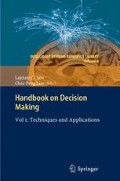Abstract
The Fuzzy Inference System (FIS) is a popular paradigm for undertaking assessment/measurement and decision problems. In practical applications, it is important to ensure the monotonicity property between the attributes (inputs) and the measuring index (output) of an FIS-based assessment/measurement model. In this chapter, the sufficient conditions for an FIS-based model to satisfy the monotonicity property are first investigated. Then, an FIS-based Risk Priority Number (RPN) model for Failure Mode and Effect Analysis (FMEA) is examined. Specifically, an FMEA framework with a monotonicity-preserving FIS-based RPN model that fulfils the sufficient conditions is proposed. A case study pertaining to the use of the proposed FMEA framework in the semiconductor industry is presented. The results obtained are discussed and analyzed.
Access this chapter
Tax calculation will be finalised at checkout
Purchases are for personal use only
Preview
Unable to display preview. Download preview PDF.
References
Bowles, J.B., Peláez, C.E.: Fuzzy logic prioritization of failures in a system failure mode, effects and criticality analysis. Reliability Engineering and System Safety 50, 203–213 (1995)
Tay, K.M., Lim, C.P.: On the Use of Fuzzy Inference Techniques in Assessment Models: Part II: Industrial Applications. Fuzzy Optimization and Decision Making 7, 283–302 (2008)
Saliu, S.: Constrained Subjective Assessment of Student Learning. Journal of Science Education and Technology 14, 271–284 (2005)
Afshar, A., Mariño, M.A., Ebtehaj, M., Moosavi, J.: Rule-Based Fuzzy System for Assessing Groundwater Vulnerability. Environment Engineering 133, 532–540 (2007)
Elsayed, T.: Fuzzy inference system for the risk assessment of liquefied natural gas carriers during loading/offloading at terminals. Applied Ocean Research 31, 179–185 (2009)
Adam Markowski, S., Sam Mannan, M.: Fuzzy logic for piping risk assessment (pfLOPA). Journal of Loss Prevention in the Process Industries 22, 921–927 (2009)
Abbass, H.A., Alam, S., Bender, A.: Mebra: multiobjective evolutionary-based risk assessment. IEEE Computational Intelligence Magazine 4, 29–36 (2009)
Yang, Z., Bonsall, S., Wang, J.: Fuzzy Rule-Based Bayesian Reasoning Approach for Prioritization of Failures in FMEA. IEEE Trans. on Reliability 57, 517–528 (2008)
Kouikoglou, V.S., Phillis, Y.A.: On the monotonicity of hierarchical sum-product fuzzy systems. Fuzzy Sets and Systems 160, 3530–3538 (2009)
Das, A., Caprihan, R.: A rule-based fuzzy-logic approach for the measurement of manufacturing flexibility. The International Journal of Advanced Manufacturing Technology 38(11-12), 0268–3768 (2008)
Pillay, A., Wang, J.: Modified failure mode and effects analysis using approximate reasoning. Reliability Engineering & System Safety 79, 69–85 (2003)
Rana, I.K.: An Introduction to Measure and Integration. Alpha Science international (2005)
Tay, K.M., Lim, C.P.: On the Use of Fuzzy Inference Techniques in Assessment Models: Part I: Theoretical Properties. Fuzzy Optimization and Decision Making 7, 269–281 (2008)
Tay, K.M., Lim, C.P.: Application of Fuzzy Inference Techniques to FMEA. Advances in Soft Computing, 161–171 (2005)
Won, J.M., Park, S.Y., Lee, J.S.: Parameter conditions for monotonic Takagi-Sugeno-Kang fuzzy system. Fuzzy Sets and Systems 132, 135–146 (2002)
Grant Ireson, W., Coombs Jr., C.F., Moss, R.Y.: Handbook Reliability Engineering and Management, 2nd edn. McGraw-Hill Professional, New York (1995)
Chrysler Corporation, Ford Motor Company and General Motors Corporation, Potential Failure Mode And Effect analysis (FMEA) Reference Manual (1995)
Guimarães, A.C.F., Lapa, C.M.F.: Effects analysis fuzzy inference system in nuclear problems using approximate reasoning. Annals of Nuclear Energy 31, 107–115 (2004)
Guimarães, A.C.F., Lapa, C.M.F.: Fuzzy FMEA applied to PWR chemical and volume control system. Progress in Nuclear Energy 44, 191–213 (2004)
Xu, K., Tang, L.C., Xie, M., Ho, S.L., Zhu, M.L.: Fuzzy assessment of FMEA for engine systems. Reliability Engineering and System Safety 75, 17–19 (2002)
Tay, K.M., Lim, C.P.: Fuzzy FMEA with Guided Rules Reduction System for Prioritization of Failures. International Journal of Quality & Reliability Management 23, 1047–1066 (2006)
Pillay, A., Wang, J.: Modified failure mode and effects analysis using approximate reasoning. Reliability Engineering & System Safety 79, 69–85 (2003)
Tummala, R.R.: Fundamentals of Microsystems Packaging. McGraw- Hill Professional, New York (2000)
Jang, J.S.R., Sun, C.T., Mizutani, E.: Neural-Fuzzy and soft Computing. Prentice-Hall, Englewood Cliffs (1997)
Nievergelt, Y.: The Concept of Elasticity in Economics. SIAM Review 25, 261–265 (1983)
Author information
Authors and Affiliations
Editor information
Editors and Affiliations
Rights and permissions
Copyright information
© 2010 Springer-Verlag Berlin Heidelberg
About this chapter
Cite this chapter
Tay, K.M., Lim, C.P. (2010). On the Use of Fuzzy Inference Systems for Assessment and Decision Making Problems. In: Jain, L.C., Lim, C.P. (eds) Handbook on Decision Making. Intelligent Systems Reference Library, vol 4. Springer, Berlin, Heidelberg. https://doi.org/10.1007/978-3-642-13639-9_10
Download citation
DOI: https://doi.org/10.1007/978-3-642-13639-9_10
Publisher Name: Springer, Berlin, Heidelberg
Print ISBN: 978-3-642-13638-2
Online ISBN: 978-3-642-13639-9
eBook Packages: EngineeringEngineering (R0)

